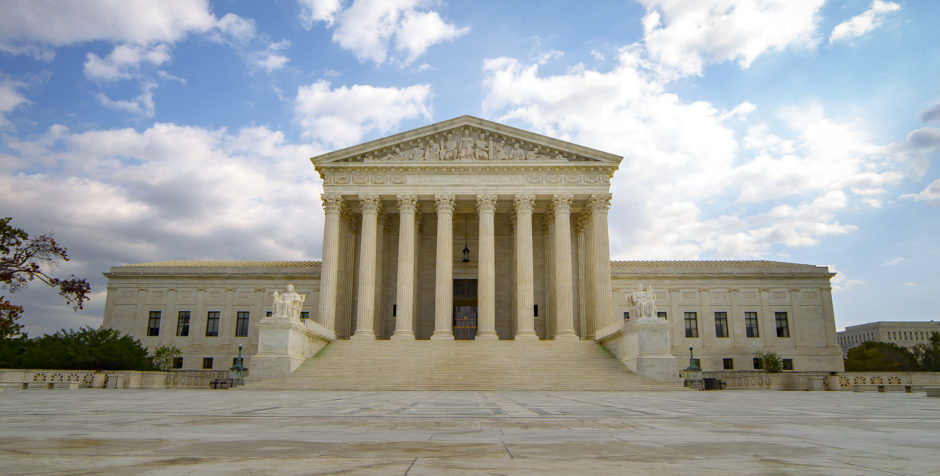Supreme Court Partially Blocks Injunctions and Will Review National Security Executive Order
Today, the Supreme Court of the United States agreed to review the two cases that imposed injunctions against the President’s national security Executive Order. The Executive Order temporarily pauses entry into the United States of refugees and nationals of six unstable and/or terrorism-infested countries (Iran, Libya, Somalia, Sudan, Syria, and Yemen).
The Court also granted in part the government’s applications to stay the enforcement of the two injunctions, which permits key aspects of the Executive Order to go into effect while the case is being considered.
The Court will hear oral argument in the two consolidated cases this fall.
Under review is a nationwide injunction imposed by a federal trial judge in Maryland against Section 2(c) of the Executive Order (suspending for 90 days entry into this country of foreign nationals from the six countries of concern) and a separate nationwide injunction imposed by a federal trial judge in Hawaii not only against Section 2(c) but also against Section 6(a) (suspending refugee admissions) and Section 6(b) (imposing a refugee admission cap). These injunctions were upheld, respectively, by the United States Courts of Appeals for the Fourth and Ninth Circuits.
The American Center for Law & Justice (ACLJ) filed two amicus (friend-of-the-court) briefs at the Supreme Court supporting the government’s request that the Court stay the injunctions and review the two cases. Our briefs were joined by over 230,000 members of the ACLJ’s Committee to Defend Our National Security from Terror.
Along with agreeing to consider the merits of the two cases this fall, the Court stayed the enforcement of critical parts of the injunctions. The Court limited the Maryland and Hawaii injunctions barring enforcement of Section 2(c) so that they now apply only to the plaintiffs and to those who can show a good faith relationship with persons or entities in the United States. In other words, a foreign national from the six countries who lacks any connection to this country (for example, one who does not have a close familial relationship) will not gain entry during the 90 day period in which the government considers improvements to the immigration and refugee screening processes.
As the Court explained, following the position set out by the ACLJ in our amicus briefs:
[T]he Government’s interest in enforcing §2(c), and the Executive’s authority to do so, are undoubtedly at their peak when there is no tie between the foreign national and the United States. . . . The interest in preserving national security is ‘an urgent objective of the highest order.’ … To prevent the Government from pursuing that objective by enforcing §2(c) against foreign nationals unconnected to the United States would appreciably injure its interests, without alleviating obvious hardship to anyone else.
Following the same logic behind its stay of the injunctions regarding Section 2(c), the Court limited the Hawaii injunction as to Sections 6(a) and Section 6(b) so that it now applies only to those people who have a good faith relationship with a person or entity in the United States.
The Court stated:
In our view, the equitable balance struck [with regard to Section 2(c)] applies to [Sections 6(a) and (b)]. An American individual or entity that has a bona fide relationship with a particular person seeking to enter the country as a refugee can legitimately claim concrete hardship if that person is excluded. As to these individuals and entities, we do not disturb the injunction. But when it comes to refugees who lack any such connection to the United States, … the balance tips in favor of the Government’s compelling need to provide for the Nation’s security.
This essentially means that for the vast majority of foreign nationals and refugees (those with no concrete relationship, family or otherwise, with an American person or entity), this Executive Order can now be enforced as the case is considered this fall. This is a big win for our national security as ACLJ Chief Counsel Jay Sekulow explained here.
In addition, the Supreme Court made it crystal clear that any misuse of the exception to the Executive Order that it carved out would not be tolerated. As the Court reiterated, “For example, a nonprofit group devoted to immigration issues may not contact foreign nationals from the designated countries, add them to client lists, and then secure their entry by claiming injury from their exclusion.”
This is a huge victory for our national security, but the fight is far from over. The ACLJ plans to file an amicus brief in support of the government’s position as the Supreme Court considers the merits of these two important cases.
Join our brief to the Supreme Court by signing our petition below.
